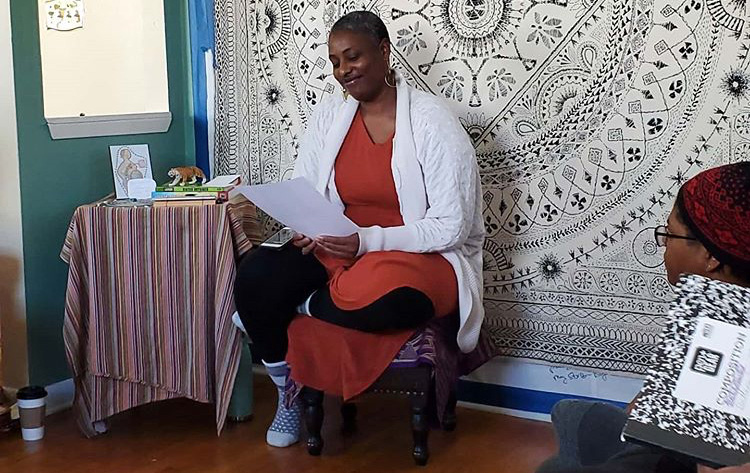
California Forward is committed to advancing policy intersections that create a more inclusive and sustainable California where all people can prosper. To move this forward, we must address the racial and geographic inequities that have been exacerbated by a public health and economic crisis, and we must answer the call to dismantle structural racism. The Voices of Shared Prosperity series amplifies the stories of Californians who are committing their time and talent to solutions that embrace equity, the environment, and the economy.
Deidre Coutsoumpos is the doula coordinator for the Doula Access Program in Riverside County. She leads the program that currently serves 150 IEHP members by providing prenatal and postpartum support at no cost to the members.
The program is the result of a partnership between the Inland Empire Health Plan (IEHP) and the Riverside Community Health Foundation (RCHF). It is also an example of emerging support for community-based programming in the state.
These initiatives are critically important parts of the revisioning process and social equity models that many communities are demanding in the wake of COVID-19 and race-based social movement. In addition, community-based programs are proven means to achieve more inclusive equitably structured communities to truly support a California that works for all residents.
When people think of doula services they often think of the expense and many people are not familiar with the term at all. “This is especially troubling because Black women and communities of color are particularly vulnerable in birth outcomes and we need doulas the most,” said Coutsoumpos. Low-income women and women of color are at the highest risk of poor birth outcomes in the United States. According to the CDC, Black women are 3 – 4 times more likely to die in childbirth or due to childbirth related complications than their White counterparts.
While this issue disproportionately impacts the Black community, it is a symptom of a broader public health crisis that has historically been delineated along color lines.
| California Dream Index Fact: In California specifically, 3% fewer Black babies are born with a healthy birth weight than the state as a whole.* That’s the difference between California’s overall healthy birthweight and Alabama’s. |
|---|
| *Launching at the 2020 California Economic Summit, the California Dream Index is a tool that measures and tracks economic mobility. |
 Coutsoumpos began her journey as a doula in 2005 but she recalled being especially motivated to examine her role in birthwork after attending a birth symposium about racial disparities in 2017. From that point, she began to focus more intentionally on Black maternal wellness. She credits this experience with motivating her social activism work. Since then, she has co-created the Sankofa Birthworkers Collective of the Inland Empire, which is another community-based program designed to address Black-White birth inequities in the inland region.
Coutsoumpos began her journey as a doula in 2005 but she recalled being especially motivated to examine her role in birthwork after attending a birth symposium about racial disparities in 2017. From that point, she began to focus more intentionally on Black maternal wellness. She credits this experience with motivating her social activism work. Since then, she has co-created the Sankofa Birthworkers Collective of the Inland Empire, which is another community-based program designed to address Black-White birth inequities in the inland region.
Studies have shown that doula support can help lower rates of cesarean births, increase breastfeeding initiation rates, decrease the likelihood of use of medical interventions, and decrease the number of babies born with low-birthweight. In addition, community-based doulas have the added benefit of increased cultural competency, culturally-centered emotional support and personal advocacy support.
The IEHP/RCHF Doula Access Program launched its pilot program at the beginning of the year and COVID-19 has magnified the need for these types of services. The program has been expanded to provide doula services for 400 members over the next two years.
Initiatives like this one are part of regional and statewide efforts to promote birth equity as a vehicle for more inclusive and equitable communities. “The need to re-vision the healthcare system is at a critical point right now,” said Coutsoumpos. “We’ve known about these issues for generations and our inequitable institutions are forcing these disparities out of the shadows and into the light.”
In 1989, the California Department of Public Health launched the Black Infant Health (BIH) program to decrease the Black-White health and social inequities for women and infants. The need for these services is just as necessary today as it was when the program was created. Coutsoumpos is an advocate for BIH and other efforts like it but she expressed that generational inherited disparities show that more needs to be done.
Her work in birth equity expands beyond direct services. Coutsoumpos outlined some specific recommendations that can take place at the state and local levels to help produce better birth outcomes including:
-
- Support for doula services in Medi-Cal – Coutsoumpos highlighted a bill, AB-2258, that was introduced earlier this year that would have provided state funding for doula support services through Medical. The bill stagnated as legislative energy shifted to COVID responses. Ironically, pandemic actually exemplifies the need for this type of support by amplifying awareness of overwhelming health disparities. There is an urgent need to serve as an early actor to address disparities facing the Black community and other marginalized groups.
-
- Increase doula training accessibility – Doula training can range from several hundred to thousands of dollars. Individuals from communities that have the highest need can’t always afford to pay out of pocket for these services. Increasing financial support to improve community birthwork practices allows communities and families to be proactive instead of reactive.
- Increase technical support for community-based birthwork programs – COVID-19 has had a profound effect on the amount of physical support doulas can provide. Doulas have moved largely to virtual platforms and have been limited in their ability to provide in-person labor and delivery support. Technical training to help community-care workers translate their services to the virtual space is critically important during this time.
Deidre is a member of the Black Maternal and Infant Health Statewide Advisory Committee, an effort supported by the University California, San Francisco and Black Women for Wellness. The Committee is responsible for updating quantitative and qualitative data surrounding disparities in Black Maternal Wellness care. Deidre strongly supports the training of more Black, Native American, Latina, and Indigenous doulas as a means to address the challenges facing these communities. She is using her voice and her platforms to create culturally affirming spaces that support birth justice and birth equity.
Instagram: @Sankofabirthworkerscollective, @the.centered.doula
Facebook: Sankofa Birthworkers Collective
Website: sankofabirthworkers.com
You can learn more about the Riverside Community Health Foundation’s Start Well Doula Access program at rchf.org/doulaaccess
The Voices of Shared Prosperity stories will be shared in advance of the 2020 California Economic Summit, taking place on December 3-4.

